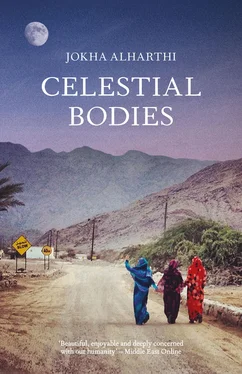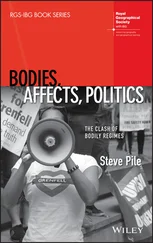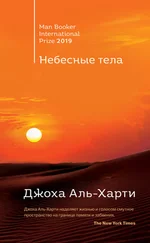That dawn I walked barefoot across the pebbles, unaware then that most of this courtyard would disappear, swallowed up by the promised marital abode. I followed the line of the trees and turned into the narrow passageway to the western courtyard which was carpeted in sand rather than soft pebbles and seemed smaller than its eastern counterpart. In all of al-Awafi ours was the only house I had ever seen that had two open courtyards surrounding it, on two of its four sides. Was that why the townspeople had named it the Big House? I wondered.
The Big House is the place I inhabit with my father, where sometimes we are visited by my aunt — his sister — and with us, in one of its many added-on rooms, live Zarifa and Sanjar, and Habib before he fled. Outside the house, but not far away from it, in very small huts live Suwayd and his brother Zaatar, and Zayd — before he drowned in the flash flood — with his wife Masouda and their daughter Shanna, plus Hafiza and her mother Saada and her three daughters whose paternal lineage is not known. All of them slaves, or at least somehow my father’s inherited property.
The Big House, spacious as it was, hardly seemed to have any empty spaces. Guests of various ages and origins were always arriving and often they stayed on. A bundled cord of wood to the side of the western courtyard and those huge black cooking pots sitting out ready for use, were a familiar sight. Zarifa and Hafiza rarely cooked in the house’s small inside kitchen, for the constant meals that had to be prepared for large numbers demanded the use of cauldrons too big for that narrow indoor cooking space. Similarly, the ritual slaughter, which was generally undertaken by Suwayd and Zaatar, took place here: the carcasses were hung and skinned in the western courtyard so they could be cooked immediately over an already-lit fire in the guest-kitchen where Zarifa baked bread too. Zarifa swore there was no comparison between meat roasted over ‘real fire’ and meat stewed in pots, which she called ‘gas-fire meat’.
On that dawn I was packed tightly with thoughts, hopes and worries, and at the same time I felt buoyant and festive. Even the soot from the cooking fire that blackened the walls of the outside kitchen — just three walls and roofing held up by wood stakes — I didn’t find ugly. Everything was beautiful: the sand, the pots, the aroma of the baking flat bread rising from inside the kitchen and floating toward the courtyard. I went in to the bare shelter of the open kitchen, doorless to allow more room for the huge pots. I found Zarifa in there, perched on two Nido powdered milk cans, her body spilling over them as she bent over the hot baking brick, pounding out the dough, stretching it across the surface and seconds later dragging it back up off the brick with wondrous skill. She didn’t even turn around as she said, Good morning, Abdallah, my boy. Or should I say, Ya hababi, Milord, since it seems you’ve become quite the big man now!
Zarifa knew, then. I didn’t say anything. Had she seen Mayya’s name scratched onto the tree trunks and scrawled across the pages in my notebooks? But Zarifa couldn’t read!
How did you know, Zarifa?
She cackled, the sound loud in that quiet early morning. Sonny, as the proverb-maker says: A human hand spread wide can’t block the sun outside.
So I got married, you see, my kind and pleasant air hostess, whose artificial smile makes me feel such pity for you. I dislike fake smiles as strongly as I do laughter. Mayya — that’s my wife, my dear hostess — did not laugh on her wedding day. She didn’t even smile.
Just before dawn, Mayya was sitting up on her bedding, the nursing baby in her lap. Her newborn daughter had finally stopped wailing and dropped off to sleep. Mayya tipped her tired aching head back against the wall. She sensed, more than she saw, the dark, shiny oily blue-green colour on the walls, giving off a hard light that hurt her eyes. Closing them, she could see the maternity wing at the Saada Hospital, the salt and oil placed on the newborn’s belly button, the wife of Abdallah’s uncle in Wadi Aday. The women visiting every morning, afternoon, and evening, fresh chicken broth, Zarifa’s saliva as she blew into the face of the baby girl and repeated half-intelligible supplications to the Divine for her protection, that enormous silver ring Zarifa wore, the white swaddling, the newborn’s tiny red tongue and her fingernails which were not allowed to be clipped lest she become a thief in her future life.
Mayya opened her eyes and studied her daughter. Her body was scrawnier than the bodies of most newborns and her scream was particularly sharp. Mayya passed her hand over the baby’s thin layer of black hair. She could not suppress the incredulity she felt. So this is motherhood then?
Every day, Asma would ask her, So what does it feel like, motherhood? Is it the greatest feeling in the world? Mayya wouldn’t answer. All she felt was exhaustion, pains in her back and belly, and an urgent need to bathe. Her itchy scalp, which made her want to constantly rub her fingers into her hair, was simply no longer bearable. Finally her mother permitted her to have a quick bath but only on condition that the water didn’t touch her hair. After all, colds stalked brand-new mothers, Salima would remind her. And if their hunt was successful, well, we all know that fever is fatal to new mothers... Meanwhile, tiresome Asma went on asking about motherhood and what she called the warm intimacy of nursing! But all that nursing meant, as far as Mayya could see, was no sleep all night long and a constant struggle with the baby to get her to open her mouth, not to mention the back pain she had after sitting in the same position for so many hours. Mayya didn’t say any of this to Asma, though. Listening to her sister kept her occupied, and she didn’t have to say anything as long as Asma was chattering on.
Mayya considered silence to be the greatest of human acts, the sum of perfection. When you were utterly quiet and still you were likeliest to hear accurately what others were saying. And whenever Mayya felt bored with their words she listened to herself in the bubble of silence she had created around her. If she said nothing, then nothing could cause her pain. Most of the time, she had nothing to say. And there were moments when she might have something to say but knew she didn’t want to speak. The muezzin’s wife approved and even pronounced a blessing over Mayya’s silence. On the Day of Judgement it will be known that your tongue has created no complaint against you.
Once this child of hers was much older, after Salim and Muhammad had arrived in the world as well, Mayya made another discovery: sleep. Sleep! She would sleep and sleep, and as long as she stayed asleep nothing could harm her. She came to realise that sleep was an even greater miracle than silence, since when she slept she did not even have to hear what others were saying. Asleep, she would not be speaking, nor would others speak to her. In her sleep she saw nothing, not even dreams. Entering the realm of sleep meant coming into a place of no responsibilities where she felt nothing, and the things she had anxiously needed to hold on to while awake fell away. The repeated nervous twitches of Muhammad’s hands; the sounds of mortal combat and tinny shouts of victory in the video game; London’s white coat, so big it accentuated her extreme thinness; the loud drip and splat of water drops from the tap onto the dirty dishes and utensils piled up in the sink; the Indonesian servant’s dubious hand gestures; the surreptitious stares of the driver looking at her in the car’s front mirror; Abdallah’s unending dialogues with London and his quarrels with Salim. When she slept, she fell into a comfortable void which sent her downwards softly and gradually to where there was no longer anything. Best of all was that no dreams passed across her vision — no nightmares, no images, no voices, nothing. She savoured her enjoyable coma, a place she could go where she had nothing to confront. Sleep was her only paradise. It was her ultimate weapon against the pounding anxiety of her existence.
Читать дальше












